We represent heirs, beneficiaries, executors, and administrators in probate and trust litigation matters throughout California.
General Questions
How do I get started?
The first step is to contact us through our website or call us. We’ll review your concerns, gather relevant documents, and let you know what to expect next.
How do I know if I have a case?
Our Intake Specialists can evaluate your case to assess your situation at no cost to you. Qualifying cases will be scheduled for a Free Phone Consultation with Attorney Scott Grossman.
Probate FAQs
What is Probate?
When the person who can sign to transfer ownership of real property has died, the court supervises the property transfer in the probate court.
What triggers the need for probate?
Probate is required when a deceased person owns property in their name only, and there’s no other legal way to transfer that property. This often includes real estate, vehicles, and bank accounts.
Do all estates go through probate?
No. Smaller estates may qualify for simplified procedures, and assets held in trusts, joint accounts, or with named beneficiaries often skip probate. We’ll help you determine what’s required.
How long does probate take?
Typically 1 to 2 years, depending on the complexity of the estate and whether disputes arise.
What if there is no will?
If no will exists, the estate is distributed under California’s intestacy laws. We’ll walk you through how that works and who inherits what.
Who can serve as executor or administrator?
Usually, the person named in the will. If there’s no will, a family member can petition the court to be appointed. We’ll help you with the paperwork and process.
Can the executor be removed if they’re doing a bad job?
Yes. If the executor is neglecting their duties, misusing funds, or causing delays, they can be challenged and replaced through the court.
How can a probate attorney help?
We handle the paperwork, meet deadlines, resolve issues, and make sure the estate is distributed properly. From filing court documents to communicating with heirs and creditors, we take care of the details so you don’t have to.
What are the costs associated with probate?
An attorney and the administrator or executor are entitled to statutory fees, which are defined by California law. You can estimate these fees using our Probate Calculator. Additional costs may include court filing fees and professional services such as appraisals, tax preparation, and accounting.
How much does The Grossman Law Firm charge for probate?
Our firm is paid according to the statutory fee schedule set out in California law. You can use our Probate Calculator to estimate those fees.
What is Probate Litigation?
Probate litigation occurs when a legal dispute arises during the probate process. This may involve challenging the will, contesting the appointment of the administrator, demanding court instruction for the executor, or objecting to how assets are being handled or distributed.
How can probate be avoided in California?
If the deceased person owned real property or other assets above a certain value and those assets were only in their name, probate is likely required. Tools like living trusts and joint ownership arrangements can help avoid probate, but they must be set up before death.
What documents are needed for probate?
We typically need the will (if there is one), death certificate, and any available account or property documents to begin the probate process.
Can I represent myself in probate court?
You are allowed to represent yourself, but we strongly advise against it. California probate cases have strict deadlines and procedural rules. Even with an attorney, there is still significant work for the executor or administrator to do.
What is your success rate in probate cases?
The Grossman Law Firm completes all probate cases in good standing with the court, ensuring deadlines are met and estates are properly administered.
Do you handle complex cases?
Yes. The Grossman Law Firm focuses on complex probate and inheritance matters throughout California.
What areas do you serve?
We serve clients in probate courts across California.
Trust Litigation FAQs
What is a trustee required to do after someone passes away?
They must notify beneficiaries and heirs, provide a copy of the trust, and begin managing trust property according to its terms. Transparency isn’t optional, it’s the law.
How much does trust litigation cost?
The cost of trust litigation depends on how long it takes to settle the matter by mutual agreement or court trial. It also depends on whether you’re a beneficiary or trustee, and whether the case is hourly or contingency-based. We’ll walk you through all the options in your consultation.
Is there a deadline to file a trust litigation case?
Yes. In California, deadlines vary depending on the issue, sometimes as short as 120 days after notice. Acting quickly protects your rights.
How can a trust litigation attorney help?
A trust litigation attorney can step in when things go wrong; whether a trustee is hiding information, mismanaging assets, or violating the terms of the trust. We investigate, explain your rights, and take legal action when needed. Most importantly, we help you make informed decisions and fight for what’s fair.
What are common causes for trust litigation?
Trust litigation often arises when the trust doesn’t reflect the settlor’s true intentions, assets appear to be missing, or the trustee fails to carry out their duties.
Probate Litigation FAQs
What is an executor legally required to do?
They must notify heirs, collect assets, pay debts, and distribute the estate according to the will. If they’re not doing that, you may need to act.
Can I remove an executor if they’re not doing their job?
Yes. If they’re neglecting duties, mismanaging assets, or acting in bad faith, the court can remove them. We can petition the court for their removal on your behalf.
What is a will contest?
A will contest challenges the validity of the will itself—often due to undue influence, fraud, or lack of capacity. If something feels off about the will, we can take a closer look.
How long do I have to file a probate dispute in California?
Deadlines vary, but in some cases, you have as little as 120 days. Don’t wait—delay could cause you to miss a deadline and cost you your right to act.
How can a probate litigation attorney help?
We help you uncover the truth, hold bad actors accountable, and ensure your rights as an heir or beneficiary are protected every step of the way. From investigating misconduct to filing petitions in court, we take on the legal burden so you do not have to worry. Our goal is to bring clarity to a difficult situation and help you secure your inheritance.









